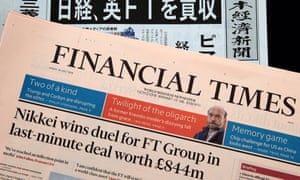Financial Times journalists vote for industrial action over pensions
NUJ members give 92% backing for action amid claims that changes will deplete pension fund by £4m in cost-saving move by new owners Nikkei
Financial Times journalists have voted in favour of taking industrial action in a dispute over proposed changes to the newspaper’s pension policy.
Almost 92% of members of the National Union of Journalists who participated in the ballot voted in favour of taking industrial action.
There was a 66% member turnout for the ballot, which closed at midday on Thursday.
“This overwhelming vote shows the widespread anger over attempts to backtrack on a commitment to maintaining our pensions after the takeover,” said Steve Bird, the father of the FT’s NUJ chapel. “FT senior managers have completely lost the trust of their staff, including most senior journalists. We will be seeking talks with our new owners and expect a clear commitment to make good any shortfall on our pensions.”
The move follows plans by Nikkei, which is expected to complete its £844m takeover of the FT Group at the end of the month, to end the final-salary pension scheme.
The NUJ, which has branded the move a “pension robbery”, claim that the new arrangements will deplete the pension by £4m in a cost-saving move by Nikkei.
The Financial Times’ NUJ chapel has a meeting scheduled at 3pm on Thursday to decide on its next steps following an improved offer from management earlier this week.
The offer, which included plugging the £4m gap but just for 2016, followed a trip to Nikkei’s Japanese headquarters by management, including chief executive John Ridding last week.
An internal email on Monday from the FT’s vice president of human resources Sarah Hopkins, suggesting action had been averted following a meeting between management and union representatives where the improved terms were presented, sparked a backlash.
Hopkins’s internal email stated that following the meeting, the union had decided to “recommend that industrial action over the pensions issue would be called off while consultations continue”.
The FT’s journalist union, who last voted in favour of strike action in a pay dispute in 2012, disputed this, saying no decision on industrial action could be made until after the chapel meets following the conclusion of the ballot.
“The company has sought to divide people and narrow down the debate, but it has failed,” said Laura Davison, NUJ national organiser. “At its heart, this dispute is about the promise made to all staff in the wake of the FT sale – a commitment to fairness and equivalence in future. A future that cannot be built for cheap on the back of cut-price pensions.”
If industrial action were to take place, the NUJ is potentially planning it for the day the sale of the FT to Nikkei is completed.

No comments:
Post a Comment